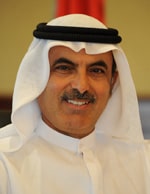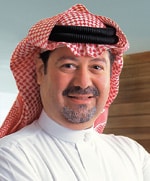MIDDLE EAST: BANKING INDUSTRY
Banks across the region learned many painful lessons during the crisis but have emerged stronger than ever.
By Gordon Platt
Financial institutions across the Middle East are carefully monitoring their loan portfolios after posting big increases in loss provisions in 2009. Growing economies, supported by high and steady oil prices and increased government spending, will help to end further deterioration in regional credit markets this year, but bankers say they are not about to resume aggressive lending.
Banks in the Gulf Cooperation Council (GCC) countries face another difficult year as they clean up their loan books, Standard & Poor’s Rating Services said in a report released in February. “The economic slowdown reveals a growing divergence in credit quality among Gulf banks,” the report said. S&P; took dozens of negative rating actions in the sector in 2009, especially for banks in Kuwait and Dubai. About one-third of the banks in the GCC have a negative outlook. Banks in Saudi Arabia and Qatar are relatively stronger than those in Kuwait and Dubai, and Bahrain-based investment banks, S&P; says.
“We are still dominated by vulnerability,” explains Adel El-Labban, group CEO and managing director of Bahrain-based Ahli United Bank (AUB), which has an extensive regional network. “The financial world seems to be in a parallel universe to the real world,” he suggests. “Rising price-earnings multiples reflect confidence in future earnings, but the earnings may not be there.”
AUB sailed through the financial crisis relatively unscathed as a result of prudent risk management, careful lending and cost controls, El-Labban says. “After increasing provisions for non-performing loans last year, we know where we stand,” he says. “I would be very disappointed if we did not reduce provisions dramatically this year.”
GCC banks will perform better in 2010 as economic growth accelerates, according to a study by Kuwait-based Global Investment House. “We believe that the GCC banks collectively have already seen the worst, and 2010 will be a year of asset and profit consolidation before the banks embark on a steeper profitability trajectory in the years ahead,” the study says. The net income of GCC banks is forecast to rise by about 7% in 2010, with provisions falling by 16% after jumping by nearly 64% in 2009.
Despite the challenging environment, AUB has been able to maintain its regional expansion. It recently increased its ownership stake in AUB Egypt to 79.6% from 35.3%. “Egypt has weathered the turmoil of the last few years better than most countries because of its strong domestic demand,” El-Labban says. “We have a focused, hybrid business model, which is not purely a local play but also a bridge to GCC markets.” As growth resumes in the Gulf, investors will want to invest their rising wealth in Egypt, El-Labban says.
AUB also has received central bank approval from Bahrain and Libya to acquire 40% of United Bank for Commerce and Investment. “We see Libya as a pre-emerging market with excellent macroeconomic fundamentals,” El-Labban says. “It has oil, record foreign currency reserves and good growth with controlled inflation.”
Banks Go Back to Basics
The recession was an eye-opener for many organizations and financial institutions around the world, suggests Abdul-Aziz Al-Ghurair, CEO of Dubai-based Mashreq. “Now, organizations are vigilant when doing business and are going back to the basics of customer service,” he says. “The economy of the region is coming up and is stronger now than ever.”
Financial institutions are adopting stricter lending principles to manage risks, Al-Ghurair says. “With the economy improving slowly, we will witness more banks lending again.”
Last year, Mashreq focused on keeping liquidity high by reducing loans while increasing deposits. “In 2010 we will continue to manage our liquidity position prudently and keep our advances [loans] to deposits ratio in the same range,” Al-Ghurair says. “Having said that, we expect both advances and deposits to grow in 2010. Mashreq has always been a responsible lender and never stopped lending, even with the financial crisis he says.
 |
|
Al-Ghurair: “We … continue to manage our liquidity position prudently” |
In Saudi Arabia, the biggest economy in the region, bank credit to the private sector was flat in 2009 after growing at a compounded annual rate of 26% in the preceding five years. “A slowdown was inevitable in light of previous strong growth and the turbulence and uncertainty that characterized financial markets,” says Abdulkareem Abu Alnasr, CEO of National Commercial Bank. There was lower demand for loans, and banks tightened lending criteria, he says.
“However, I expect loan growth to rebound in 2010,” Abu Alnasr says. “The massive investment program being undertaken by the Saudi government and state-owned enterprises will stimulate demand for credit, and the Saudi banks have the appetite and capacity to lend.” Banks currently earn 25 basis points on their placements with the Saudi Arabian Monetary Agency (SAMA) and are looking to redeploy these funds into assets that produce a higher return, Abu Nasr says, but the banks will not compromise their underwriting standards.
As investor confidence is restored, bankers expect to see a moderate rise in capital market activity in 2010. The market for sukuk, or shariah-compliant financial certificates that are similar to bonds, is becoming more active after being rattled by the Dubai World debt woes. Saudi Arabian Oil, also known as Aramco, and Total, Europe’s largest refiner, have selected Deutsche Bank, Samba Financial Group and Credit Agricole to manage a $1 billion sukuk for a 400,000 barrels-per-day refinery. Meanwhile, Saudi property developer Dar Al Arkan Real Estate Development raised $450 million in February through a global sukuk sale.
The Dar Al Arkan five-year sukuk was the first international issue from the GCC in 2010. It was also the first by a company based in Saudi Arabia to take advantage of Rule 144A, which exempts private placements with qualified institutional buyers from registration with the US Securities and Exchange Commission. The 144A route made it possible for US investors to participate directly in a Saudi issue for the first time, notes Majid Al-Sayed Bader Al-Refai, managing director and CEO of Bahrain-based Unicorn Investment Bank, a lead manager and shariah adviser for the offering.
While sukuk issuance is picking up, no flood of offerings is likely. “The market is not exactly at its best right now,” Al-Refai says. However, there are a number of solid family-run businesses in Saudi Arabia that would make good candidates for public offerings, he adds. “I tell them they are sitting on gold,”Al-Refai says. “The kingdom is a treasure chest for sukuk issues.”
The global financial crisis was a blessing in disguise for Islamic finance, which uses safer methodology in structuring issues, Al-Refai says. The biggest roadblock to the further development of Islamic capital markets, he adds, is what he calls the herd mentality of Islamic bankers. “When the crisis hit, they were all in real estate,” he says. “The R&D; [research and development] concept doesn’t exist in the Gulf.”
Islamic Principles Pay Off
 |
|
Abu Alnasr: “Investment programs… will stimulate demand for credit” |
The fundamentals of Islamic finance should deliver a better result than conventional finance during such crises, says Ted Pretty, acting CEO of Gulf Finance House (GFH), a leading Bahrain-based Islamic investment bank that has promoted or sponsored some of the biggest infrastructure projects in the region. Islamic banks have had less impact from the causes of the downturn because they were not involved with high-risk financial derivatives, he says. “Transactions are grounded in real underlying commodity transactions,” he adds. Any financial instrument, Islamic or conventional, is only as good as the credit quality of the borrower. “The question is, who is your true underlying counterparty?” Pretty says.
Like other investment banks, GFH was hit by the property market downturn across much of the region. Islamic financial institutions and Islamic investment banks had a higher degree of exposure to real estate, Pretty explains. “Liquidity dried up, and there were no buyers for some projects,” he points out. “No one was immune.”
GFH successfully refinanced a WestLB-led syndicated facility after paying down $300 million when due in February and getting $100 million back, as part of an Islamic financing arrangement. The bank also reached an agreement with Bahrain-based Liquidity Management Center syndicate to rearrange its wakalah facility. Wakalah is an Islamic financial contract in which an investor places cash with a lender who then uses it to buy qualifying financial assets. “These agreements demonstrate that people have confidence in our business model and strategy,” Pretty says. “We had some speed bumps in our debt profile, and given that liquidity is tight, we are smoothing them out.”
Pretty says GFH kept assets on its balance sheet too long. “An investment bank should take the view that these assets are stocked for sale and should be held no longer than two or three years,” he points out. “GFH is good at originating and packaging new deals, he adds. “We are traders. We incubate banks and insurance companies and then sell them.” GFH announced last month that it is at an advanced stage for establishing Syria’s largest Islamic bank. It is working with local Syrian business partners to create Syria Finance House, which will be capitalized at $333 million. “Islamic commercial and investment banking in Syria promises great potential for growth with a significant demand for Islamic financial services and low penetration,” Pretty says.
GFH plans to complete $250 million in asset sales by the end of the second quarter, including its stake in Khaleeji Commercial Bank, a successful Islamic retail bank that it created. “I think we are out of the woods,” Pretty says. “We have taken the pain up front, although we still have to work through some legacy assets.”
The Central Bank of Bahrain, the single integrated regulator of Bahrain’s financial services industry, is more hands-on than most similar institutions, Pretty says. “It wants regular updates on projects, including investor exits, balance-sheet and liquidity measures, exposures and compliance,” he says. “We walk them through the results once a week.”
Following the crisis, the central bank is being proactive in ensuring that individuals in control positions in banks are competent by interviewing them before approving their appointment. Other regulators in the region are also becoming more rigorous. The Qatar Financial Center Regulatory Authority (QFCRA) and Dubai Financial Services Authority (DFSA) have agreed to share supervisory information on financial institutions operating in both centers. “As markets and regulatory jurisdictions are brought closer together in today’s ever more complex financial environment, it is increasingly important that regulators share information and working practices as a means of bolstering their effectiveness,” says Phillip Thorpe, chairman and CEO of QFCRA.
“In the past year, the importance of effective coordination and cooperation between regulators cannot be overstated,” says Paul Koster, CEO of DFSA. “We are looking forward for better ways of working together to resolve problems and prevent their repetition.”



